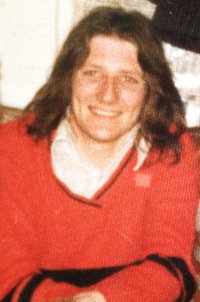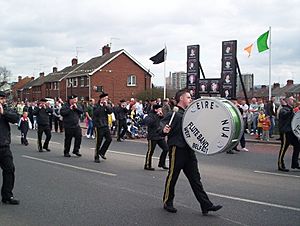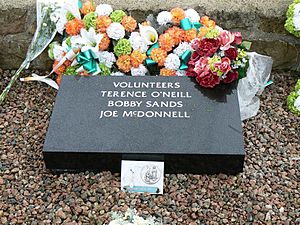Bobby Sands facts for kids
Quick facts for kids
Bobby Sands
|
|
|---|---|
| Roibeárd Ó Seachnasaigh | |

Sands in Long Kesh, 1973 (aged 18–19)
|
|
| Member of Parliament for Fermanagh and South Tyrone |
|
| In office 9 April 1981 – 5 May 1981 |
|
| Preceded by | Frank Maguire |
| Succeeded by | Owen Carron |
| Majority | 1,447 (2.4%) |
| Personal details | |
| Born | 9 March 1954 Dunmurry, County Antrim, Northern Ireland |
| Died | 5 May 1981 (aged 27) HM Prison Maze, County Down, Northern Ireland |
| Cause of death | Starvation |
| Political party | Anti H-Block |
| Spouse |
Geraldine Noade
(m. 1973) |
| Children | 1 |
| Relatives | Bernadette Sands McKevitt (sister) |
| Website | Bobby Sands Trust |
| Military service | |
| Allegiance | |
| Years of service | 1972–1981 |
| Unit | First Battalion South West Belfast, Belfast Brigade |
| Battles/wars | The Troubles |
Robert Gerard Sands (also known as Roibeárd Gearóid Ó Seachnasaigh in Irish; born 9 March 1954 – died 5 May 1981) was a well-known Irish republican who became a leader among prisoners in the Maze Prison in Northern Ireland. He is most remembered for leading a hunger strike in 1981, during which he sadly died.
During his hunger strike, Bobby Sands was elected to the British Parliament. His death, and the deaths of nine other hunger strikers, brought a lot of attention to the Irish republican movement around the world.
Contents
Growing Up in Northern Ireland
Bobby Sands was born in Dunmurry in 1954. He was the oldest of four children. His family moved several times when he was young. They first moved to a new area called Abbots Cross in Newtownabbey.
In 1961, his family faced difficulties from some neighbors. They had to move in with friends before finding a new home in Rathcoole. Rathcoole was a mixed area, and Bobby played football for a local club called Stella Maris.
As he grew older, the situation in Northern Ireland became more difficult. By 1966, there was more tension between different groups in areas like Belfast. Bobby noticed that some of his Protestant friends stopped talking to him. This made him feel more connected to other Catholics.
He left school at 15 in 1969. He started learning to be a coach builder at Alexander's Coach Works in 1970. However, he faced constant harassment from some co-workers. In 1971, he was threatened and told not to return to work. This event made him feel that joining a group like the Provisional Irish Republican Army (IRA) was the only way to make things better. He joined the IRA later that year.
In 1972, Bobby's parents' home was attacked, and they had to move again. They moved to a Catholic area in West Belfast called Twinbrook. By 1973, many Catholic families had left Rathcoole because of the violence.
Bobby Sands and Prison Life
Bobby Sands was arrested in October 1972. He was charged with having four handguns. In April 1973, he was found guilty and sentenced to five years in prison. He was released in April 1976.
After his release, he returned to his family in West Belfast. He became active again with the Provisional IRA. In October 1976, he was involved in an incident at the Balmoral Furniture Company in Dunmurry. He and three others were arrested after a gun battle with the police. One of the revolvers used was found in their car. In September 1977, Bobby Sands and the others were sentenced to 14 years in prison for having the revolver.
After his sentencing, Sands was sent to a special punishment area in Crumlin Road Prison. The cells were very basic, with only a bed, mattress, and a pot for waste. Prisoners were not allowed books, radios, or other personal items, except for a Bible and some religious pamphlets.
Life in Maze Prison
In late 1980, Bobby Sands became the leader of the Provisional IRA prisoners in the Maze Prison. He took over from Brendan Hughes, who was part of an earlier hunger strike. Republican prisoners had been protesting since 1976. They wanted to get back their "Special Category Status". This status would have given them some special rights, different from ordinary criminals. Their protest started with the "blanket protest", where prisoners refused to wear prison uniforms and wore blankets instead.
Bobby Sands' Writings
While in prison, Bobby Sands wrote many letters and articles. These were published in a republican newspaper called An Phoblacht. He used the pen name "Marcella," which was his sister's name.
He also wrote two books: Skylark Sing Your Lonely Song (published in 1989) and One Day in My Life (published in 1983). Sands also wrote the words for several songs. Two of these, "Back Home in Derry" and "McIlhatton," were later recorded by the famous singer Christy Moore. Another song, "Sad Song for Susan," was also recorded. The tune for "Back Home in Derry" came from a 1976 song by Gordon Lightfoot. "Back Home in Derry" is about how Irish people were sent to Van Diemen's Land (now Tasmania, Australia) as prisoners in the 1800s.
The Hunger Strike of 1981
The 1981 Irish hunger strike began when Bobby Sands refused to eat on 1 March 1981. Sands decided that other prisoners should join the strike at different times. This was planned to get the most attention from the public. The prisoners slowly became weaker over several months.
The hunger strike had five main demands:
- The right not to wear a prison uniform.
- The right not to do prison work.
- The right to meet with other prisoners and organize educational or fun activities.
- The right to one visit, one letter, and one package each week.
- To get back the time off their sentences that they had lost because of their protest.
The main goal of the hunger strike was for the prisoners to be seen as political prisoners, not just criminals. Before Sands died, The Washington Post newspaper reported that the hunger strike's main aim was to get attention from around the world.
Becoming a Member of Parliament
Soon after the hunger strike began, Frank Maguire, who was a Member of Parliament (MP) for Fermanagh and South Tyrone, sadly died. This meant there would be a special election in April 1981.
This election was a chance for Bobby Sands' supporters to raise awareness about the hunger strike. Other political groups decided not to run, so Sands was nominated as a candidate. He ran under the name "Anti H-Block/Armagh Political Prisoner." After a very intense campaign, Bobby Sands won the election on 9 April 1981. He received 30,493 votes, beating his opponent, Harry West, who got 29,046 votes. Sands became the youngest MP at that time. However, he died in prison less than a month later and never took his seat in the British Parliament.
After Sands was elected, the British government passed a new law called the Representation of the People Act 1981. This law stops prisoners serving more than one year in jail from being candidates in British elections. This meant that other hunger strikers could not be elected to Parliament.
Bobby Sands' Death
Bobby Sands died on 5 May 1981, at the Maze prison hospital. He was 27 years old and had been on hunger strike for 66 days. The official report said he died from "starvation, self-imposed."
For many Irish republicans, Bobby Sands became a martyr. When his death was announced, there were several days of protests in nationalist areas of Northern Ireland. More than 100,000 people attended Sands' funeral. He was buried in the 'New Republican Plot' in Milltown Cemetery, alongside many others.
Impact of His Death
After Bobby Sands, nine more members of the IRA and Irish National Liberation Army died during the 1981 Irish Hunger Strike. On the day of Sands' funeral, a Unionist leader named Ian Paisley held a memorial service in Belfast to remember the victims of the IRA. In the Irish general election held that same year, two candidates who supported the hunger strikers won seats.
Bobby Sands' death led to more activity for the IRA. The group gained more members and was able to raise more money. Both nationalists and unionists became more set in their beliefs. Bobby Sands' seat in Parliament was won by his election agent, Owen Carron, who ran with an even larger number of votes. Soon after Sands' death, the new law was passed, preventing other prisoners from running in elections.
Bobby Sands in Popular Culture

Bobby Sands' story has inspired many artists. The band The Grateful Dead dedicated a song to him at a concert the day after he died.
Many songs have been written about the hunger strikes and Sands' death. These include songs by bands like Easterhouse, Black 47, and singers like Christy Moore. Christy Moore's song, "The People's Own MP," describes Sands as a hero. The U.S. rock band Rage Against the Machine has also mentioned Bobby Sands as an inspiration.
In 2013, the Scottish football club Celtic F.C. was fined by UEFA because their fans displayed banners with Bobby Sands' image and a political message during a game.
Bobby Sands has also been shown in several films:
- In the 1996 film Some Mother's Son, he was played by John Lynch.
- In the 2001 film H3, he was played by Mark O'Halloran.
- Michael Fassbender played Bobby Sands in the 2008 film Hunger. This movie was about the last six weeks of Sands' life during the hunger strike. It won an award at the 2008 Cannes Film Festival.
- The 2016 documentary film Bobby Sands: 66 Days tells his story.
Bobby Sands' Family
Bobby Sands married Geraldine Noade in prison on 3 March 1973. Their son, Gerard, was born on 8 May 1973. Geraldine later moved to England with Gerard.
Bobby Sands' sister, Bernadette Sands McKevitt, is also a well-known Irish republican. She helped start the 32 County Sovereignty Movement in 1997. She did not agree with the Good Friday Agreement, saying that Bobby did not die for the things that were agreed upon.
His granddaughter, Erin, played for the County Down team that won the All-Ireland Junior Ladies' Football Championship in 2023.
See also
 In Spanish: Bobby Sands para niños
In Spanish: Bobby Sands para niños
- List of United Kingdom MPs with the shortest service
- Terence MacSwiney – A Lord Mayor of Cork who died in prison after a hunger strike in 1920.
Images for kids
 | James B. Knighten |
 | Azellia White |
 | Willa Brown |



